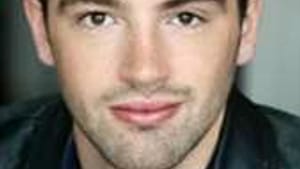Stay in the Loop
BSR publishes on a weekly schedule, with an email newsletter every Wednesday and Thursday morning. There’s no paywall, and subscribing is always free.
The way we were (before we came out)
Mauckingbird's "The Temperamentals'

I find it hard to commiserate. This is my nature. So when a play asks me to empathize with the plight of handsome, self-effacing men who can sing on key, I tend to be skeptical and noncommittal.
The Temperamentals (homosexuals' code name for themselves in the 1940s and '50s) mixes metaphors about the Army-McCarthy hearings of 1954, Communism and sexual identity as political and personal statements.
But from the opening dialogue between the Communist agitator Harry Hay (Matt Tallman) and the young Viennese refugee fashion designer, Rudi Gernreich (John Jarboe), I was drawn into actually caring about the two. I took this interest because the playwright, Jon Marans, wisely refrained from opening with a diatribe about their homosexuality but instead carefully unfolded the dance of life that two people conduct during the first unfolding steps in a relationship. In the process he showed Hay and Gernreich as no difference from "all the young lovers, wherever they are."
Only after the scene ended and the story line imploded did I realized that of course there was all the difference in the world as to how the world (in the 1950s) looked on such a pair of lovers.
Still, it was easy to perceive the stage characters not solely as homosexuals but as purely human and much like me. Once I became concerned, I paid attention. This was a significant feat in my case, because Harry Hay the protagonist was not my cup of tea. More like a dose of hemlock.
Talking about Kinsey
Hay was all about confrontation and political activism. After he and Gernreich hooked up, they started canvassing beaches in the Los Angeles area known as homosexual gathering places and inviting people to a discussion group about the Kinsey Report, then newly released. Hay argued publicly that homosexuals were a minority group— a preposterous notion a time when homosexuality was considered a mental disorder. Eventually they convinced Bob Hull (Doug Greene), a student in Hay's Southern California Labor School class, and his friends, Chuck Rowland (Mike Dees) and Dale Jennings (Carl Grainer). They formed a political group that in 1950 became the Mattachine Society (named for a French medieval masque group), one of the first homosexual rights groups.
Ultimately, the society kicked Hay out because his past Communist activities became a red herring. But the group endured to become a prime force behind the gay rights movement.
Had The Temperamentals stuck to only this partisan political line, it wouldn't have interested an apolitical (and straight) soul like me. Instead, I became absorbed in the play's rich array of interpersonal relationships: Hay's farce of a marriage to a fellow traveler; Gernreich's need to mask as a heterosexual; Hull's doomed relationship with the flighty Chuck Rowland; and Chuck's penchant for taking on other lovers.
Collapsing Greek tragedy
All of this human intrigue is rendered plausible by the lyricism of the dialogue and the imploringly macabre singing of the chorus (Marans is a trained musicologist) as this California Greek tragedy collapses upon its characters: Rudi leaves Harry for designer stardom, Harry becomes a hippie, Dale takes a job with the Ice Capades, Chuck commits suicide and Bob ends up teaching theater arts.
Is this the stuff of great drama? Maybe not. But small human stories can be scintillating too, especially when they coalesce into large political movements.
The Temperamentals (homosexuals' code name for themselves in the 1940s and '50s) mixes metaphors about the Army-McCarthy hearings of 1954, Communism and sexual identity as political and personal statements.
But from the opening dialogue between the Communist agitator Harry Hay (Matt Tallman) and the young Viennese refugee fashion designer, Rudi Gernreich (John Jarboe), I was drawn into actually caring about the two. I took this interest because the playwright, Jon Marans, wisely refrained from opening with a diatribe about their homosexuality but instead carefully unfolded the dance of life that two people conduct during the first unfolding steps in a relationship. In the process he showed Hay and Gernreich as no difference from "all the young lovers, wherever they are."
Only after the scene ended and the story line imploded did I realized that of course there was all the difference in the world as to how the world (in the 1950s) looked on such a pair of lovers.
Still, it was easy to perceive the stage characters not solely as homosexuals but as purely human and much like me. Once I became concerned, I paid attention. This was a significant feat in my case, because Harry Hay the protagonist was not my cup of tea. More like a dose of hemlock.
Talking about Kinsey
Hay was all about confrontation and political activism. After he and Gernreich hooked up, they started canvassing beaches in the Los Angeles area known as homosexual gathering places and inviting people to a discussion group about the Kinsey Report, then newly released. Hay argued publicly that homosexuals were a minority group— a preposterous notion a time when homosexuality was considered a mental disorder. Eventually they convinced Bob Hull (Doug Greene), a student in Hay's Southern California Labor School class, and his friends, Chuck Rowland (Mike Dees) and Dale Jennings (Carl Grainer). They formed a political group that in 1950 became the Mattachine Society (named for a French medieval masque group), one of the first homosexual rights groups.
Ultimately, the society kicked Hay out because his past Communist activities became a red herring. But the group endured to become a prime force behind the gay rights movement.
Had The Temperamentals stuck to only this partisan political line, it wouldn't have interested an apolitical (and straight) soul like me. Instead, I became absorbed in the play's rich array of interpersonal relationships: Hay's farce of a marriage to a fellow traveler; Gernreich's need to mask as a heterosexual; Hull's doomed relationship with the flighty Chuck Rowland; and Chuck's penchant for taking on other lovers.
Collapsing Greek tragedy
All of this human intrigue is rendered plausible by the lyricism of the dialogue and the imploringly macabre singing of the chorus (Marans is a trained musicologist) as this California Greek tragedy collapses upon its characters: Rudi leaves Harry for designer stardom, Harry becomes a hippie, Dale takes a job with the Ice Capades, Chuck commits suicide and Bob ends up teaching theater arts.
Is this the stuff of great drama? Maybe not. But small human stories can be scintillating too, especially when they coalesce into large political movements.
What, When, Where
The Temperamentals. By Jon Marans. Mauckingbird Theatre Company production through April 29, 2012 at The Skybox at the Adrienne Theater, 2030 Samson St. (215) 923-8909 or www.mauckingbird.org.
Sign up for our newsletter
All of the week's new articles, all in one place. Sign up for the free weekly BSR newsletters, and don't miss a conversation.

 Jackie Schifalacqua
Jackie Schifalacqua